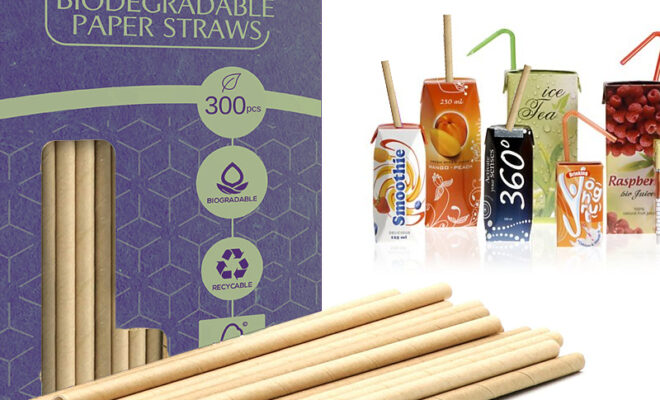Paper or Biodegradable Straw To Use After Single-Use Plastic Ban

After the Single-Use Plastic Ban FMCG companies are ready to use Paper or Biodegradable Straw as an alternative. But there are many challenges to deal with.
Even though FMCG companies are all set to implement alternatives in response to the ban on single-use plastics that will take effect on July 1st, the majority of businesses do not have any immediate plans to pass on the increased costs to customers.
RS Sodhi is the MD of Gujarat Cooperative Milk Marketing Federation, situated in Anand, which controls Amul said,
“We have been able to locally source some of our need for biodegradable plastic straws, in addition to paper straws imported from South Korea & China that will be supplied by mid-July.
Even though we had sought out some further time to prepare alternatives. Amul needs approximately 1 million little straws per day for just their most popular tetra pack sweet lassi, Masti Chaas, and Tru flavored milks.”
Keep Reading
Paper straws are admittedly at least 6-7 times more costly than plastic straws, but Sodhi said that they wouldn’t be passed on to customers right away.
According to Sodhi, the brand intends to build biodegradable straw manufacturing facilities within Amul’s facilities soon in order to keep long-term expenses in check.
There are also plans to alter the little tetra pack spouts to do away with the need for straws.
These and other FMCG behemoths like Dabur, Emami, Vadilal, and Rasna are prepared to take on the challenge.
Straws are widely used by consumer goods giant Dabur, whose Real fruit juices dominate the market for health beverages.
The manufacturing of Real juice packets with built-in paper straws has already started at Dabur.
According to ED, operations, Dabur India,
“We are dedicated to complying with the requirements and will make sure that all packs include integrated paper straws.”
Additionally, Dabur insiders informed FE that despite the fact that the paper straws are imported and therefore more expensive, the company is now absorbing the expense rather than passing it along to customers.
Paper straws are estimated to cost between 30 and 40 pence per unit, compared to 10-15 pence for plastic ones.
Emami, a major FMCG company with its headquarters in Kolkata, also plans to outlaw single-use plastics. We have gradually reduced the usage of single-use plastics during the last few years.
The transition to a complete prohibition has certain financial repercussions, but for the time being, a hike in product prices is not anticipated, according to Naresh Bhansali, CEO of finance, strategy, and business development at Emami.
For some time now, certain companies have already been going through the transformation. The largest producer of soft drink concentrates in the nation, Rasna, is situated in Ahmedabad, and it is ready for the plastic ban.
Piruz Khambatta, chairman and managing director of Rasna said,
“The ban on single-use plastics won’t harm us because we don’t utilize cheap plastic for even packaging needs.
We have been employing plastics of a permitted grade for the past 5 years. Currently, none of our products necessitate the use of plastic cutlery or straws.”
The prohibition on single-use plastics, according to Devanshu Gandhi, ED & MD of Vadilal Industries, a major producer of ice cream in the nation, won’t have any effect on Vadilal’s operations.
“Single-use plastic is not used here. Therefore, the notification won’t affect us in any way,” he said.
Director-general of the All India Plastics Manufacturers’ Association Deepak Ballani, however, emphasized that appropriate handling of plastic waste should also be a priority.
He declared, “We need to strengthen garbage segregation and expand our recycling infrastructure.”



